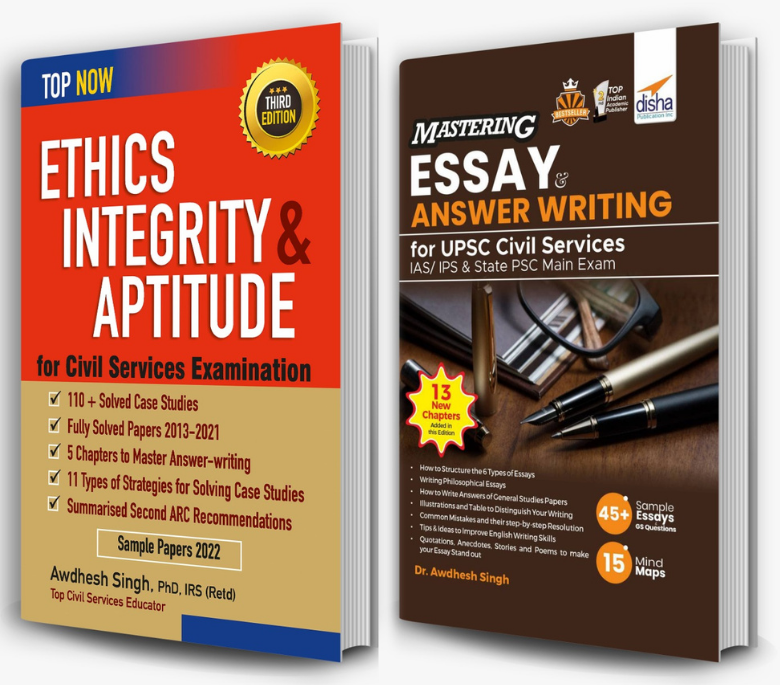Solved Ethics Papers
Topics
All
Civil Services in India (26)
Ethics, Integrity and Aptitude
» Chapters from Book (11)
» Case Studies (8)
Solved Ethics Papers
» CSE - 2013 (18)
» CSE - 2014 (19)
» CSE - 2015 (17)
» CSE - 2016 (18)
» CSE - 2017 (19)
» CSE - 2018 (19)
» CSE - 2019 (19)
» CSE - 2020 (19)
» CSE - 2021 (19)
» CSE -2022 (17)
» CSE-2023 (17)
Essay and Answer Writing
» Quotes (34)
» Moral Stories (18)
» Anecdotes (11)
» Beautiful Poems (10)
» Chapters from Book (5)
» UPSC Essays (40)
» Model Essays (38)
» Research and Studies (4)
Economics (NCERT) Notes
» Class IX (14)
» Class X (16)
» Class XI (55)
» Class XII (53)
Economics Current (51)
International Affairs (20)
Polity and Governance (61)
Misc (77)
Select Topic »

Civil Services in India (26)
Ethics, Integrity and Aptitude (-)
» Chapters from Book (11)
» Case Studies (8)
Solved Ethics Papers (-)
» CSE - 2013 (18)
» CSE - 2014 (19)
» CSE - 2015 (17)
» CSE - 2016 (18)
» CSE - 2017 (19)
» CSE - 2018 (19)
» CSE - 2019 (19)
» CSE - 2020 (19)
» CSE - 2021 (19)
» CSE -2022 (17)
» CSE-2023 (17)
Essay and Answer Writing (-)
» Quotes (34)
» Moral Stories (18)
» Anecdotes (11)
» Beautiful Poems (10)
» Chapters from Book (5)
» UPSC Essays (40)
» Model Essays (38)
» Research and Studies (4)
Economics (NCERT) Notes (-)
» Class IX (14)
» Class X (16)
» Class XI (55)
» Class XII (53)
Economics Current (51)
International Affairs (20)
Polity and Governance (61)
Misc (77)

Q14. Stopping the Misuse of RTI Act
Q14. You are a Public Information Officer (PIO) in a government department. You are aware that the RTI Act 2005 envisages transparency and accountability in administration. The act has functioned as a check on the supposedly arbitrarily administrative behaviour and actions. However, as a PIO, you have observed that there are citizens who have filed RTI applications not for themselves but on behalf of such stakeholders who purportedly wanted to have access to information to further their own interests. At the same time, there are those RTI activists who routinely file RTI applications and attempt to extort money from the decision makers. This type of RTI activism has affected the functioning of the administration adversely and also possibly jeopardised the genuineness of the applications which are essentially aimed at getting justice.
What measures would you suggest to separate genuine and non-genuine applications? Give merits and demerits of your suggestions. (250 words, 20)
Answer
The RTI Act has been quite effective in curbing several types of mischiefs in government organisations. Once officers know that people can access the government files, they are careful while taking decisions and avoid arbitrary and illegal decisions.
However, RTI has also been misused by many people to harass honest officers by seeking unnecessary information and finding faults to embarrass them. Moreover, it costs huge resources of the government to retrieve information. This reduces the time available with the government officers to do their own official work.
The following measures are suggested to improve the execution of the RTI Act:
• Information asked should pertain to the person asking for the information.
• If information does not pertain to the applicant, it can still be provided if public interest is involved. However, the nature of public interest must be disclosed while seeking information and the PIO must take the decision based on the facts in each case.
• The authorities must identify frivolous RTI applicants and impose heavy penalties on such people.
• The actual cost of providing information must be recovered from the applicant instead of a nominal cost fixed by the government a decade ago.
• Information provided under the RTI must have a caveat that it can’t be used for commercial or publicity purposes.
All these measures are likely to be opposed by media and RTI activists. The opposition parties may also make it a political issue. Hence, it may give negative publicity to the government. However, if the issues are properly explained, people will appreciate the reasons for the reforms and accept the changes. (262 words)

Looking for a One-stop Solution to prepare for ‘Ethics, Integrity, and Aptitude’ and ‘Essay and Answer Writing’ for UPSC?
Buy Dr. Awdhesh Singh’s books from the links below-
Buy Dr. Awdhesh Singh’s books from the links below-
Ethics, Integrity & Aptitude for Civil Services Examination
Amazon - https://amzn.to/3s1Qz7v
Flipkart - https://bit.ly/358N2uY
Mastering Essay & Answer Writing for UPSC Civil Services
Amazon - https://amzn.to/3JELE2h
Flipkart - https://bit.ly/3gVIwmv
| Related Articles |
| Recent Articles |
